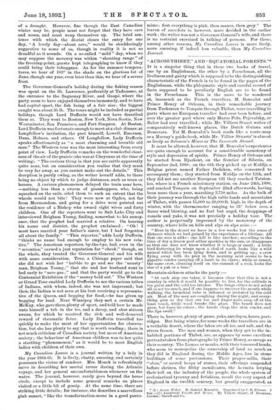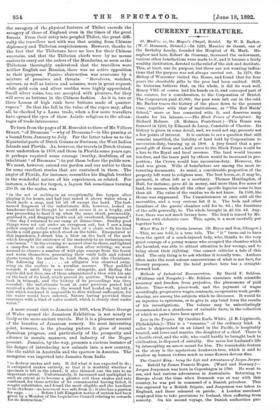"ACROSS THIBET," AND "EQUATORIAL FORESTS."* Ix is a singular thing
that in these two books of travel, one by an Englishman, the other by a Frenchman, all the liveliness and gaiety which is supposed to be the distinguishing characteristic of the French is to be found in the pages of the Englishman, while the phlegmatic style and careful record of facts supposed to be peculiarly English are to be found in the Frenchman. This is the more to be wondered at, inasmuch as the French travellers, M. Bonvalot and Prince Henry of Orleans, in their remarkable journey from Turkestan to Tonquin through Thibet, were travelling in parts where no European traveller had ever been before, and over the greater part where only Marco Polo, Prjevalsky, or Ba.ber had ever travelled ; while Mr. Villiers Stuart writes of comparatively well-known places, like Dutch Guiana and Demerara. Yet M. Bonvalot's book reads like a route-map or a Murray's guide-book, while Mr. Villier Stuarts' is almost as lively as Solomon's Mines or The Innocents Abroad.
It must be allowed, however, that M. Bonvalot's experiences are quite enough to account for a considerable monotony of style and depression of spirits. Prince Henry of Orleans and he started from Djarkent, on the frontier of Siberia, on September 2nd, 1889; on the 6th they picked up at Kuldja a Belgian priest named Father Dedaken, who consented to accompany them ; they started from Kuldja on the 12th, and they did not see another European till they reached Tatsien- ion, where is a French missionary station, on June 24th, 1890, and reached Tonquin on September 22nd afterwards, having been more than a year, marching 3,750 miles. As the bulk of their journey was through the high table-lands and mountains of Thibet, with passes 15,000 to 20,000 ft. high, in the depth of
winter, with the thermometer ranging to 310 below zero, a fierce wind blowing, and no fuel but argol, the droppings of
camels and yaks, it was not precisely a holiday tour. The author is perpetually impressed by the monotony of the country, where hills on hills and alps on alps arise :—
"Here in the desert we have in a few weeks lost the sense of distance which we had gained by the experience of a lifetime. All that one sees is alike : one hill is like another ; according to the time of day a frozen pool either sparkles in the sun, or disappears so that one does not know whether it is large or small ; a little bird fluttering its wings upon a clod of earth looks like a wild animal which has been lying down, and is getting up ; a crow flying away with its prey in the morning mist seems to be a gigantic condor carrying off a lamb in its claws ; while at sunset, the same crow, cleaning itself on the summit of a rock, looks the size of a yak or a bear."
Mountain-sickness attacks the party :— "At each step one takes, it becomes clear that this is not a country in which it would be possible to live, for the solitude is too great and the cold too intense. The lungs either do not act at all or act too much, and if one happens to uncover the mouth while walking, the bronchial tube is inflamed or irritated by the cold air. Most of the men are coughing during the night, and every- thing gets so dry that our toe and finger nails snap off at the least touch, while wood breaks like glass. The beard does not grow. but loses its colour ; the hands chap, the skin cracks, and the lips swell."
There is, however, plenty of game, yaks, antelopes, hares, part- ridges. But being winter,for some weeks the travellers are in a veritable desert, where the lakes are all ice, and salt, and the rivers frozen. The men and women, when they get to the in- habited portions of Thibet, are, as appears by some excellent portraitstaken from photographs by Prince Henry, as savage as their country. The Lamas, or monks, with their tonsured heads, who seem to monopolise the ownership of land as much as they did in England during the Middle Ages, live in stone buildings of some pretensions. Their prayer-mills, their " obos," or sacred heaps of stones, their offerings suspended before shrines, the filthy mendicants, the hermits levying their toll on the industry of the people, the whole system of ecclesiastical tyranny and fetishism, recall the very aspect of England in the twelfth century, but greatly exaggerated, as striking little details ; for instance, she describes a marvellous • (1) Across Thibet. Bs Gabriel Bonvalot. Translatel. by C. B. Pitman. 2 fob —(2 ) Equatorial Forests and litres. By Villiers Stuart, of Dromana.
the savagery of the physical features of Thibet exceeds the savagery of those of England even in the times of the great forests. From their entry into peopled Thibet, the great diffi- culty the travellers met with was that arising from Chinese diplomacy and Thibetan suspiciousness. However, thanks to the fact that the Thibetans have no love for their Chinese suzerains, and that the Thibetan chiefs were by no means zealous to carry out the orders of the Mandarins, so soon as the Thibetans thoroughly understood that the travellers were neither English nor Russian, there was no active opposition to their progress. Passive obstruction was overcome by a mixture of promises and threats. "Revolvers, watches, mirrors, as well as knives and scissors, were in great request, while gold coin and silver roubles were highly appreciated. Small silver coins, too, are accepted with pleasure, for they will serve as buttons in the Chinese fashion. As it is, two or three Lamas of high rank have buttons made of quarter- rupees." So that the fall in the value of the rupee may, after all, be checked by a Lama trade, when a few more travellers have opened the eyes of these Asiatic religious to the advan- tages of trade-intercourse.
To turn from the pages of M. Bonvalot to those of Mr. Villiers Stuart, " of Dromana "—why of Dromana P—is like passing at a bound from January to July. For the latter takes us to the Equatorial parts of Dutch Guiana or Surinam, the West Indian Islands and Florida. As, however, the travels in Dutch Guiana were undertaken in 1858, and those in Florida some years ago, it perhaps required some courage (worthy, doubtless, of an inhabitant "of Dromana") to put them before the public now. We must, however, extend our pardon and our notice to them for some excellent stories that are contained in them. The angler of Florida, for instance, resembles his English brother in the wonderful nature of his experiences, as related. For instance, a fisher for tarpon, a lagoon fish sometimes turning 250 lb. on the scales, was
"in the act of reeling-in an exceptionally fine tarpon after playing it for hours, and had just raised it above water when a shark made a snap, and bit all off except the head. The last- named fragment of the unfortunate fish, however, looked so handsome that he thought he would secure it as a trophy, and was proceeding to haul it up when the same shark, presumably, grabbed it, and dragging tackle and all overboard, disappeared." "One day I returned to our camp at dinner-time. Sundry good things were set out under an evergreen oak, but I saw a long yellow serpent coiled round the back of a chair, with his head inside a cold game-pie which stood on the table. Exasperated at this impudence, I struck him a blow on the back of the neck which brought the existence of his snakeship to an instantaneous conclusion. ' "In the evening we moored close to shore, and lighted a camp-fire to cook our dinner. Soon after retiring, we were amused to observe a number of wild pigs emerge from the forest and warm themselves, presenting their curly tails and rotund sterns towards the embers to toast them, just like Christians.
The following day an alligator was observed swim- ming on the surface in a peculiar manner. They paddled towards it until they were close alongside, and finding the reptile did not dive, one of them administered a blow with his axe on the back of its head, which proved its quietus. They towed it back in triumph, and the history of its proceedings was then revealed : the unfortunate beast at some previous period had received a shot in the nose ; the wound had healed up, but left a hole which rendered it impossible to dive without suffocation, for the water would have entered, Nature having provided these creatures with a kind of valve nostril, which is closely shut under water."
A more recent visit to Jamaica in 1891, when Prince George of Wales opened the Jamaican Exhibition, is not nearly so lively as the more ancient travels. But it is a pleasant account of the beauties of Jamaican scenery. Its most interesting point, however, is the pleasing picture it gives of recent Jamaican progress, and particularly of the prosperity and advance in morals, manners, and industry of the Negro peasant. Jamaica, by-the-way, presents a curious instance of the danger of introducing new animals into a new country, like the rabbit in Australia and the sparrow in America. The mongoose was imported into Jamaica from India
" to destroy snakes and rats. It did what it was expected to do ; it extirpated snakes entirely, so that it is doubtful whether a specimen is left in the island; it also thinned out the rats to an important extent. Unfortunately, it increased and multiplied to such an extent as to become a greater evil than snakes and rats combined, for these articles of its commissariat having failed, it sought substitutes, and found the most eligible and the handiest to be chickens—no hen-roost was safe from it ; it also has a passion
for eggs Before I left Kingston notice of motion had been given by a Member of the Legislative Council relating to rewards for its destruction."







































 Previous page
Previous page